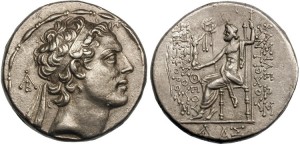
Daniel 11 presents a sweeping view of the historical realities that dominated the ancient near east in the years between Daniel’s death right up to the years just before the birth of the Messiah. The precision with which Daniel addresses the historical events is amazing, and generally affirmed by historians both secular and theological as incredibly accurate. No small wonder some believe Daniel must have lived after the fact, that his book was written shortly before the birth of Jesus. No one could have gotten the details right without an historical view. And yet Daniel did write these memoirs in the 500s BC, and everything written of, from his vantage point, if prophecy.
Daniel 11:2-35 present twenty-two historical characters of note. For our purposes here we will highlight three of them. The first was Xerxes. He was the king of Persia, portrayed in the story of Esther and known as the ruler who sought to encroach upon the Greeks (think of the Spartans and the 300 soldiers who stood against him). He is the individual referenced in Daniel 11:2 as the “fourth” who “shall be far richer than all” the previous kings. In effect, with his encroachments upon Greece, he kicked a hornet’s nest, stirring up the wrath of the Greek people. The last words of verse 2 reinforce this.
The second character is Alexander the Great. When he rose to power as king of the Greek people he was determined to conquer the Persians. And he did in dramatic fashion, and having defeated them went on to rule an empire made up of over one million square miles of territory. But then he died early, and his kingdom was split four ways among his generals. Daniel 11:4 tells of this.
Two of the four pieces into which Alexander’s empire was split included the land presently known as Syria, which went to the Seleucid dynasty, and the land presently known as Egypt, which went to the dynasty of Ptolemy. In the many long decades that followed these two dynasties went back and forth in a bloody grudge match over power and territory, and situated right between them was the land of Israel. Ultimately, a Seleucid king named Antiochus IV Epiphanes came to power. He was greatly feared, and sought to extend his rule over the whole region beyond his own borders. After one serious defeat against the Ptolemaic armies, he wormed his way back home humiliated and angry. When he moved his armies through Jerusalem on his trip home he took out his rage against the city. Daniel 11: 30-31 flesh this out, and demonstrate the degree to which Antiochus wreaked havoc, ultimately, we know from history, sacrificing a pig on the altar in the Jewish temple, and erecting a statue to Zeus, thus declaring himself to be like Zeus and worthy of worship. All hell broke loose upon the Jews following this, and finally, after a few short years of bloodshed, Antiochus IV and his minions were routed.
But Daniel 11:36 goes in a seemingly different direction. The historical details come to screeching halt. Attempts to identify the ruler of verse 36 with Antiochus fail; the details simply do not match anything in history—certainly not with the precision of the preceding verses. Unless, of course, it is not history from our vantage point, but is prophecy, yet to be fulfilled.
And this squares with Daniel 7, Daniel 8 and Daniel 9, where we see historical realities give way to still future events. And this particularly squares with Daniel 8, where we have previously seen Antiochus IV Epiphanes serve as a type for a future ruler—the antichrist!
Daniel 11:36 and following give us some hints about the nature of the antichrist. He will be a religious despot who demands the worship of the people of the world; throwing off the religious shackles of the past (I think, particularly the secular humanism that dominates the western world today) as well as denying the reality of Messiah (the “one beloved by women,” which is euphemistic for the hope young Jewish women had to one day give birth to Israel’s Messiah).
He will also be a military despot; one who shall “honor the god of fortresses” (Dan. 11:38). Militarism will dominate him, and he will leverage military might for his own personal gain.
And he will also be a materialistic despot, one who is consumed with the accumulation of wealth. The gathering of gold and silver and precious stones and costly gifts will drive him. And he will used these things for political gain. Thus it is that he will also be a political despot, desperate to establish a world order the center of which will be himself. Daniel 11:39 unpacks this feature for us.
Despots, however, make enemies, and it is evident from Daniel 11 that kingdoms both north and south of him do not want his leadership. They attempt to destroy him, but being especially powerful, and leveraging all of the resources at his disposal, he quickly deals a blow to those who come against him. It is noteworthy that his victory seems to take place in the land of Israel (cp. Dan. 11:40-41).
Suddenly word from the east comes, and this gives way to the great battle of Armageddon. The armies from the east, according to Revelation 9:16 include over 200,000,000 soldiers; something which China could easily provide today! Daniel 11:45 makes clear that his end comes fast. We find out, of course, in Daniel 12 (for another discussion) that this demise is because of the coming in glory of our Lord.
One additional note: preceding the tribulation era will be, in my estimation, the rapture of the church. Revelation 3:10 sets this up, and then Jesus affirms this still more in John 14:1 and following. Of course, the Apostle Paul helps as well by reminding the reader of the restrainer of sin that is removed prior to the antichrist’s rise to power. I think this restraining force is the Holy Spirit working in and through the church. With the church gone because of the rapture, then the antichrist is free to rise up, establish his covenant with Israel (cp. Dan. 9:27), et cetera.
But these things to come are intended not to scare us but sober us. They are not intended to simply fill our minds with detail but to inspire us. And the rapture for believers is not intended to be an escape mechanism. It is, rather, an invitation to be an activist urgently presenting the story of Jesus in word, thought and deed, that many more will embrace Christ before he returns in glory.
 “Write This Down…” provides a restatement of selected points or observations from various teaching venues at which Pastor Matthew speaks. The preceding material is from Pastor Matthew’s sermon entitled, “The Antichrist, Part II,” part of the sermon series “Memoirs of an Ancient Prophet: A Study of the Book of Daniel,” presented the weekend of April 10, 2011, at Bethel Church.
“Write This Down…” provides a restatement of selected points or observations from various teaching venues at which Pastor Matthew speaks. The preceding material is from Pastor Matthew’s sermon entitled, “The Antichrist, Part II,” part of the sermon series “Memoirs of an Ancient Prophet: A Study of the Book of Daniel,” presented the weekend of April 10, 2011, at Bethel Church.

